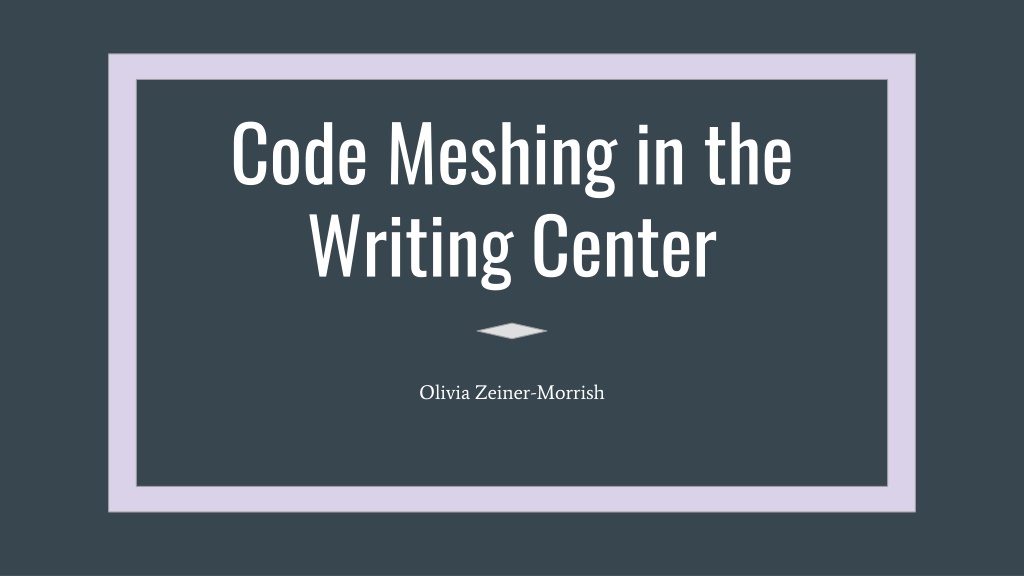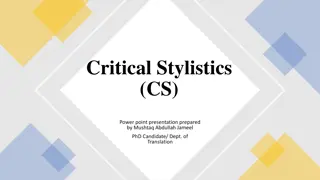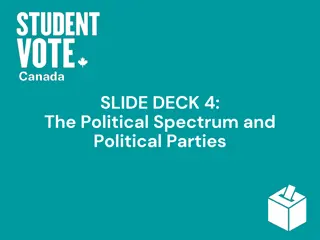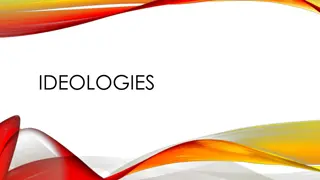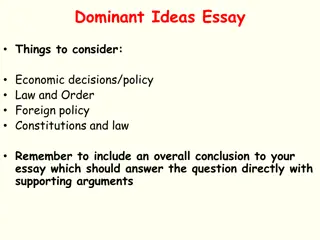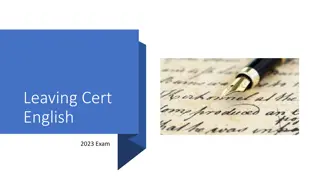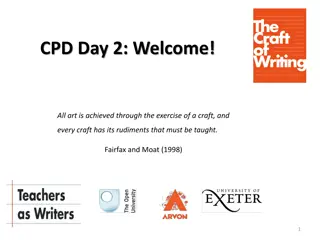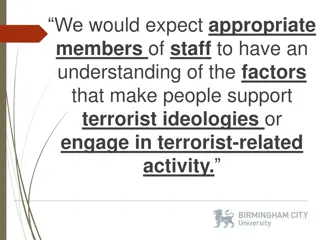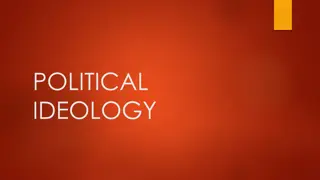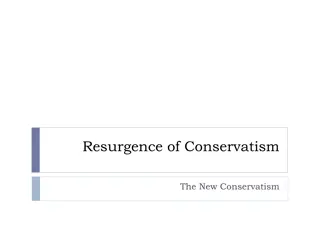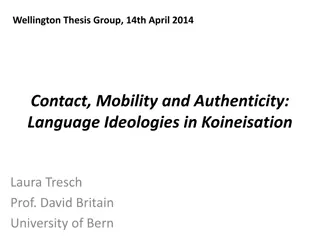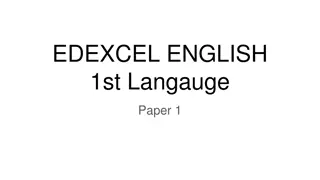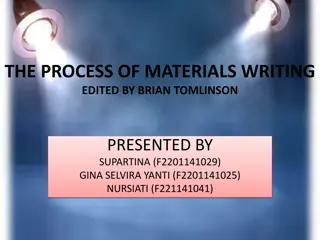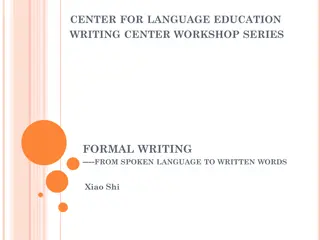Understanding Language Ideologies in Writing Education
Exploring the debate on whether writers should use their own English or conform to standard language rules, this content delves into the perspectives of Stanley Fish and Vershawn Ashanti Young. Fish argues for teaching standard English to avoid prejudice, while Young critiques this view, advocating for embracing plurilingualism and code meshing in writing education.
Download Presentation

Please find below an Image/Link to download the presentation.
The content on the website is provided AS IS for your information and personal use only. It may not be sold, licensed, or shared on other websites without obtaining consent from the author. Download presentation by click this link. If you encounter any issues during the download, it is possible that the publisher has removed the file from their server.
E N D
Presentation Transcript
Code Meshing in the Writing Center Olivia Zeiner-Morrish
Should Writers Use They Own English? Cultural critic Stanley Fish come talkin bout in his three-piece New York Times What Should Colleges Teach? suit there only one way to speak and write to get ahead in the world, that writin teachers should clear [they] mind of the orthodoxies that have taken hold in the composition world ( Part 3 ). He say dont no student have a rite to they own language if that language make them vulnerable to prejudice (110). When you began reading this piece, what did you think? Were you confused? Surprised? What had you expected?
Should Writers Use They Own English? Vershawn Ashanti Young / dr. vay - dr. vay has authored nine books and is best known for his work on code meshing. - He is a professor in the departments of Communication Arts and English and Literature at the University of Waterloo. - Draws on the disciplines of communication, composition and rhetoric, education, American literature, and theatre.
A Response to What Should Colleges Teach? - Young critiques Stanley Fish s New York Times article, What Should Colleges Teach? - Fish believes that professors should teach their students to speak and write in standard English, because using non-standard forms of English will expose them to prejudice . - He suggests that professors frame this as second language learning: I m not here to take that language from you; I m here to teach you another one (111). - Fish s views are prominent on college campuses and reflected many writing centers. - Young says that Fish supports language discrimination because he believes there is only one acceptable form of language.
Defining Standard/Dominant Language Ideology Standard language ideology is the belief that there is one set of dominant language rules that stem from a single dominant discourse (like standard English) that all writers and speakers of English must conform to in order to communicate effectively (111). Dominant language ideology also say peeps can speak whateva the heck way they want to BUT AT HOME! (111).
A Plurilingual Society - Young argues that people are far more plurilingual than we want to recognize. - No one in our society adheres entirely to standard English, all of the time. - However, some people can get away with not meeting the rules, while others get punished for it. - This is largely because linguistics and race are intertwined. - Young wants our society reject standard language ideology and embrace plurilingualism and code meshing.
Code Switching vs. Code Meshing - From a linguistic perspective, code switching means two languages and dialects co-existing in one speech act (114). - However, the term has come to mean that students should speak a certain way at school and a different way at home. - To correct this misunderstanding, Fish presents the term code meshing. - Code meshing blend dialects, international languages, local idioms, chat-room - lingo, and the rhetorical styles of various ethnic and cultural groups in both formal and informal speech acts (114). - These are two terms with very similar denotations, but very different connotations.
An Example of Code Meshing Common texting abbreviation All caps brings emphasis, alleviating need for an exclamation point Backslash functions like a semicolon to connect the emphatic fragment to the previous thought Grassley is loud-talking a black English device where a speaker indirectly insults an authority figure. The authority figure is meant to overhear the conversation so that the insult can be defended as unintentional. Grassley sent the message over his Twitter social network but he address Obama. He wanna point out what seem like a contradiction: If healthcare reform is so important to Obama, why is he sightseeing in Paris? (116)
Why Code Meshing? - Tweets can be 140 characters and Grassley s is only 80. So why was he code meshing? - Young s answer is simple: cuz all kinds of folks know, understand, and like code meshing (116). - Code meshing benefits everybody. - In many ways [black] working-class speakers are more effective narrators, reasoners, and debaters than many middle-class [white] speakers, who temporize, qualify, and lose their argument in a mass of irrelevant detail So when we teach the rhetorical devices of blacks we can add to the writing proficiency of whites and everybody else (116). - Code meshing helps all writers to be more rhetorically effective. - Most importantly, another real, real good result is we gone help reduce prejudice. Yes, ma am. Now that s a goal to reach for (117).
So What Should We Do? - Rather than prescribing how individuals should write or speak, Young wants language to be taught descriptively. This means focusing on how language functions within and from various cultural perspectives, instead of teaching concrete rules to follow. - This means that writing might not look exactly like what we are used to. Young hopes for students to be taught what it takes to understand, listen, and write in multiple dialects simultaneously . What would this look like in the writing center? - - -
Activity: Putting Youngs argument into practice - Partner up with the person sitting next to you. - Each pair will receive a slip of paper that describes a hypothetical tutoring session. - Now imagine that you are Dr. Young. What advice do you give your tutee? - After discussing the feedback from Dr. Young s perspective, reflect on your own tutoring methods. Would you do the same?
Centering Code-Meshing at the UCWbL - The University Center for Writing-based Learning at DePaul University - Quinn Mulroy gives a tutors perspective on code meshing Personally, I don t feel I ve done a particularly good job of putting the principle of code-meshing into practice in my tutoring. From sentence structure to word choice to quote integration, so much of my go-to advice in appointments would be more accurately classified as encouraging code-switching than code-meshing.
Centering Code-Meshing at the UCWbL - - Mulroy strongly agrees with Young s argument and reiterates many of his ideas. Mulroy urges tutors to reflect on the inherent separate but equal assumptions that underlie the beliefs of someone like Fish. He also reflects on the challenges of implementing Young s ideas in his own tutoring practice. Significantly, this approach may sometimes entail encouraging the writer to say or write things that may be grammatically incorrect, or inadvisable by traditional Strunk & White standards. This may be an adjustment for some tutors, and can certainly be an adjustment for me. - -
How can we encourage code meshing, rather than code switching? - Mulroy discusses a handout created by Sarah Lamade, a former writing tutor at the University of Rochester. - This handout provides tutors with strategies for incorporating code-meshing into tutoring sessions and questions to ask the writer.
Situations and strategies for incorporating code meshing into tutoring:
Discussion Questions: Do you think we teach code meshing successfully at the Trinity College Writing Center? How could we improve our practices, both in the Writing Center as a whole and as individual tutors? How can we help students to strengthen their academic writing without silencing their identity?
